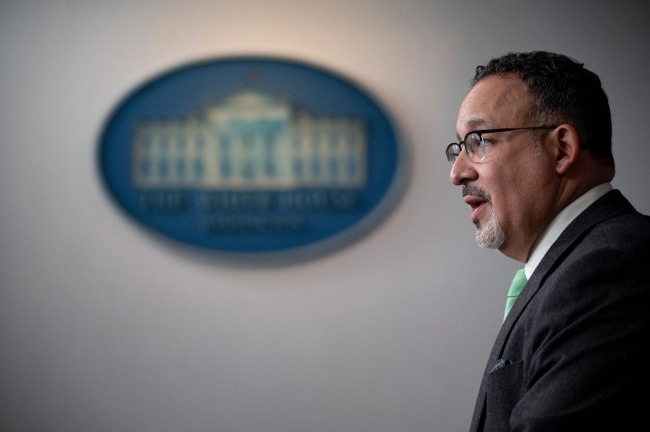You have /5 articles left.
Sign up for a free account or log in.

Education Secretary Miguel Cardona said the department is determined “to drive a constant drumbeat of action to fulfill the transformational potential” of the new federal financial aid application, which launched at the end of 2023.
Jim Watson/Getty Images
The U.S. Education Department is relaxing a number of requirements so that colleges and universities dealing with delayed student financial aid information can better focus on processing aid applications and delivering aid packages to students.
The department announced today that it will reduce the proportion of financial aid forms it reviews for potential inaccuracy, suspend all new reviews of colleges’ compliance with financial aid rules and offer institutions flexibility in their applications to renew their eligibility to access federal financial aid programs.
Those changes build on the department’s strategy, announced last week, to support colleges with the update to the Free Application for Federal Student Aid, which has been plagued by delays and technical glitches.
“Here’s the bottom line: fewer requirements for colleges and universities this spring means more time and resources freed up to deliver financial aid for students to make the most of the better FAFSA,” Education Secretary Miguel Cardona said Monday evening on a call with reporters.
Institutions have less time than usual this spring to package aid offers after the department delayed the launch of its new FAFSA by three months and is holding off on sending students’ application information to colleges until March. The delays have forced many colleges to adjust the deadlines by which students need to commit.
In a letter to the Education Department Monday, more than 100 lawmakers said they were disappointed in the delays and concerned about how the issues with the federal aid form will affect students. They welcomed the department’s latest efforts to support institutions but sought more clarity about the agency’s plans moving forward.
“It is imperative that we all work together to ensure no student falls through the cracks or faces unnecessary challenges in accessing the aid they are due,” they wrote.
Cardona said the latest steps were in response to input from financial aid administrators and college leaders about the challenges they are facing with the new form, which also includes a new methodology for determining students’ aid eligibility. College officials were underwhelmed by the department’s initial support plan, which includes deploying teams of federal experts to underresourced institutions. The department will select institutions, starting this week, for the additional help, using a number of criteria such as the percentage of students eligible for Pell Grants.
The National Association of Student Financial Aid Administrators called on the department in a December letter to reduce the percentage of applications selected for verification—a process that’s “tedious and burdensome for students and financial aid administrators alike, even in the best of times,” the organization wrote.
The department selected about 18 percent of applications in the 2021–22 academic year for the audit, though that figure dropped during the pandemic. Only those applicants who are eligible for Pell Grants can be selected for income verification, which requires applicants to submit tax returns to verify their income. Department officials didn’t say how much they planned to reduce verification rates by, though they plan to focus on identity fraud.
“We’re going to bring verification rates to their lowest ever,” a senior department official said on the Monday call with reporters.
The department also will suspend all new routine program reviews through 2024, except for those related to serious wrongdoing such as suspected fraud, which was another one of NASFAA’s requests. The reviews are an oversight tool that the agency uses to ensure institutions are meeting their requirements to remain eligible for federal financial aid.
This change could offer relief to several dozen institutions, a senior department official said, adding that “we know it’s a lot of work for them once they do get selected for this process.”
To help institutions prepare for the processed applications, the department is planning to release test versions of the student information records by Friday. Cardona urged every college to start testing as soon as those records become available.
“We are determined to drive a constant drumbeat of action to fulfill the transformational potential of the better FAFSA,” Cardona said. “The steps we’re announcing today build on the Better FAFSA College Support Strategy by making it easier for colleges and universities to get financial aid packages to students and families as quickly as possible. We will strive to leave no stone unturned to make this FAFSA process easier and simpler for colleges, universities and students.”
Higher education leaders praised the department's latest moves.
“We applaud these initial measures from the department to significantly lower student verification requirements and temporarily pause program reviews, which are critical first steps in ensuring financial aid offices—already stretched perilously thin—will have the bandwidth necessary to focus on students," said Justin Draeger, president and CEO of NASFAA. "To make this work, higher education stakeholders require a sustained effort, which includes additional administrative relief and the department meeting its FAFSA processing timelines going forward. Schools have been told to expect test records by the end of this week, and processed FAFSA information in the first half of March, which will be vital to provide students and families with need-based financial aid information this spring. Students and families cannot afford any additional delays."




